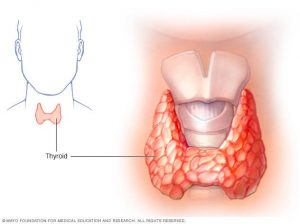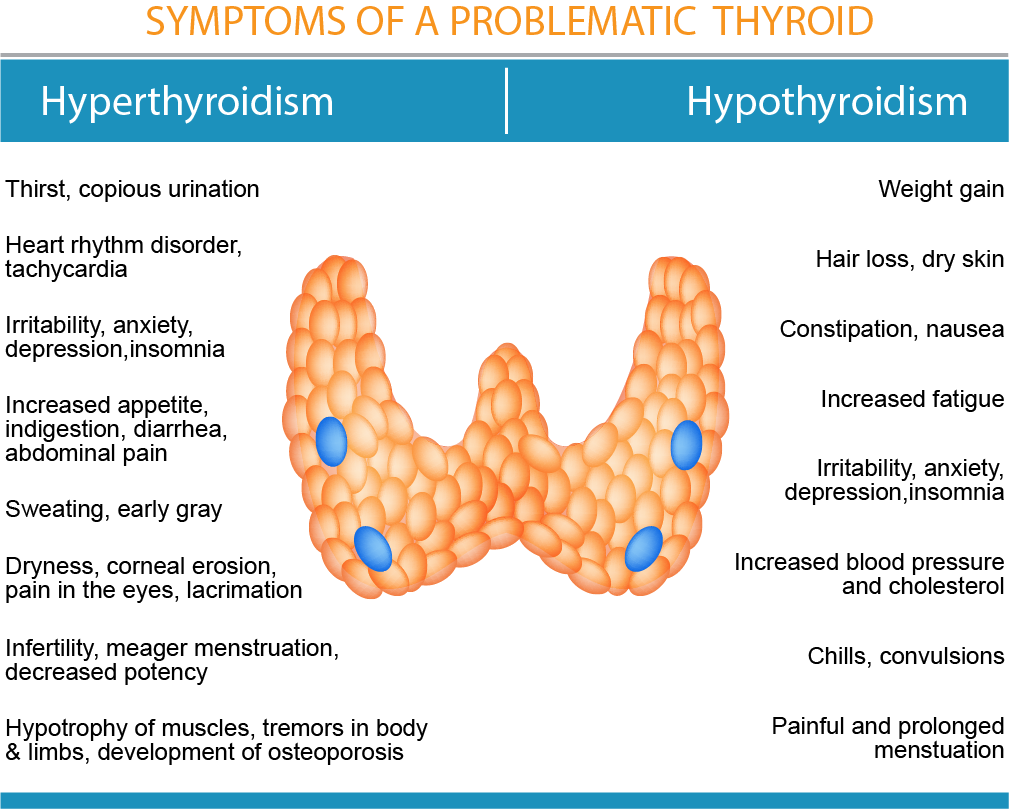THYRODISM: OVERVIEW
- The thyroid gland influences the majority of the metabolic processes in your body.
- Thyroid disorders will vary from a small, harmless goitre (enlarged gland) that desires no treatment to dangerous cancer.
- the foremost common thyroid issues involve abnormal production of thyroid hormones.
- an excessive amount of internal secretion ends up in a condition called glandular disease.
- insufficient hormone production results in glandular disorder.
- Although the consequences are often unpleasant or uncomfortable, most thyroid issues are often managed well if properly diagnosed and treated.

WHAT CAUSES THYROID PROBLEMS.
- All types of hyperthyroidism are due to Associate in Nursing production of thyroid hormones, however, the condition will occur in many ways:
- Graves’ disease: the assembly of an excessive amount of internal secretion.
- Toxic adenomas: Nodules develop within the endocrine and start to secrete thyroid hormones, disconcerting the body’s chemical balance; some goiters could contain many of those nodules.
- Subacute thyroiditis: Inflammation of the thyroid that causes the secretor to “leak” excess hormones, leading to temporary hyperthyroidism that typically lasts many weeks, however, could persist for months.
- Pituitary gland malfunctions or cancerous growths within the thyroid gland: though rare, hyperthyroidism can even develop from these causes.
- Hypothyroidism, against this, stems from Associate in Nursing production of thyroid hormones.
- Since your body’s energy production needs sure amounts of thyroid hormones, a come by endocrine production results in lower energy levels.
CAUSES OF HYPOTHYROIDISM INCLUDE:
- Hashimoto’s thyroiditis : during this autoimmune disease, the body attacks thyroid tissue. The tissue eventually dies and stops manufacturing hormones.
- Removal of the thyroid gland: The thyroid could are surgically removed or with chemicals destroyed.
- Exposure to excessive amounts of iodide: Cold and sinus medicines, the guts medicine amiodarone, or sure distinction dyes given before some X-rays could expose you to an excessive amount of iodine.
- You may be at bigger risk for developing glandular disorder if you’ve got had thyroid issues within the past.
- Lithium: This drug has additionally been concerned as a reason for glandular disorder.
- Untreated for long periods of your time, hypothyroidism will cause a myxedema coma.
- A rare however doubtless fatal condition that needs immediate endocrine treatment.
- Hypothyroidism poses a special danger to new-borns and infants.
- a scarcity of thyroid hormones within the system at Associate in Nursing early age will cause the event of hypothyroidism (intellectual disability) and nanism (stunted growth).
- Most infants currently have their thyroid levels checked habitually presently once birth. If they’re hypothyroid, treatment begins instantly.
- In infants, as in adults, glandular disorder are often thanks to these causes:
- A pituitary disorder
- A defective thyroid
- Lack of the gland entirely.
SYMPTOMS OF HYPERTHYROIDISM
- The Excessive amounts of T4, T3, or both can cause an high metabolic rate. This is known as hypermetabolic state.
- When in a hypermetabolic state, patient experience thyroid gland itself can swell into a goitre, which can be either symmetrical or un-symmetrical.
- Patient eyes may also appear quite prominent, which is a sign of exophthalmos, a condition that’s related to dangerous disease.
- Other symptoms of hyperthyroidism include:
- breast development in men
- increased appetite
- inability to concentrate
- nausea and vomiting
- irregular heartbeat
- difficulty sleeping
- fine, brittle hair
- fine, brittle hair
- nervousness
- restlessness
- weakness
- itching
- hair loss
The following symptoms require immediate medical attention:
- shortness of breath
- loss of consciousness
- fast, irregular heart rate
- Dizziness
Hyperthyroidism also causes atrial fibrillation, a dangerous arrhythmia that can lead to strokes, as well as congestive heart failure.

